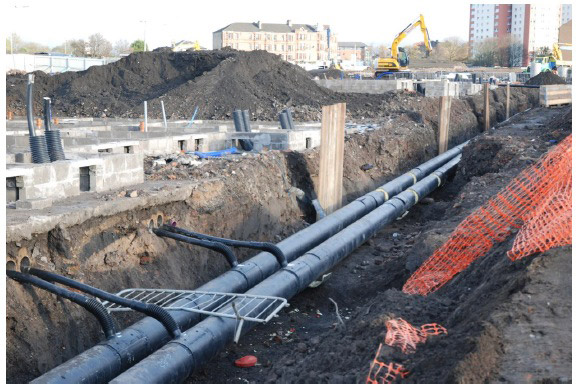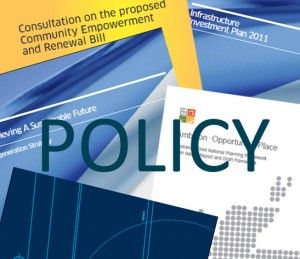Regular SURF columnist David Stewart contends that major investments in large scale transport projects like HS2 are of limited value to disadvantaged communities. Do energy efficiency and housing retrofit programmes offer a more effective approach of using limited infrastructure resources to address poverty and deprivation?
As the effects of recession brought on by the banking crisis of 2007/08 continue to be felt, discussions on stimulating growth and recovery have recently begun to focus on the supposed benefits of investing in infrastructure. Given that we live in times where public spending is constrained, with savage cuts to the welfare budget by the UK Government, it seems important to examine these claims and consider how investing in infrastructure might have the most positive impacts on the communities of Scotland.

Artist’s impression of new HS2 terminal at Manchester Piccadilly Station
To date, much of the political and media discourse on investing in infrastructure has concentrated on large scale projects such as the HS2 rail project in England – comparable projects in Scotland, although commissioned before the recession, might be the M74 road extension or the replacement Forth road crossing. The argument for investing in such large scale projects would seem to be that they improve a country’s or region’s economic competitiveness by enhancing transport and communication links.
While I’m no economist, it strikes me that there is a danger with this approach – it seems that any benefit to poorer communities would be based on a trickle down effect from increased economic activity. Given how expensive major infrastructure projects are (HS2 is forecast to cost £43 billion), that seems a major risk at a time of spending cuts. There are also concerns that the benefits of such investments as HS2 will be concentrated in the areas they serve.
So, is there a way to invest in infrastructure that has more immediate and obvious benefits for poorer communities? The Scottish Federation of Housing Associations (SFHA) and a number of its partner organisations have been arguing for investment in infrastructure as a way of providing clear benefits to communities and their local economies. We have
been calling for funding to be invested to pay for area based schemes that improve the energy efficiency of communities on a street by street and house by house approach, with funding and loans put in place in order to enable social landlords, private landlords and owner occupiers to have the most cost effective energy efficiency measures installed in their homes.

The SFHA is calling for more funding to support improved energy efficiency in Scottish housing
The SFHA and the Existing Homes Alliance, a coalition of fuel poverty, environmental, housing and building organisations, have been campaigning for a national retrofit programme with funding to support area based retrofit schemes. We believe that such a scheme would bring significant benefits to poorer communities by cutting fuel bills and creating significant jobs and training opportunities, while also cutting carbon emissions.
Housing has long been recognised by academics and economists as having a significant multiplier effect, creating and sustaining large number of jobs for public money invested in it (and the SFHA continues to campaign for investment in new build affordable housing as a way of stimulating the economy and meeting housing need). Investing in retrofit programmes has the potential to provide significant jobs and training opportunities, and would be particularly effective as programmes would logically concentrate on areas with higher concentrations of poverty and fuel poverty where housing required investment.

A district heating scheme in Maryhill, Glasgow
To date, the SFHA and the Existing Homes Alliance have had some success in campaigning for a national retrofit programme to cut fuel poverty and provide jobs and training. The Scottish Government is investing £79m in 2013/14 to support home energy efficiency and cut fuel poverty, with the majority earmarked for area based schemes. This funding, coupled with an estimated £120m from the Energy Company Obligation funded by large energy suppliers, provides a significant sum of money to support area based schemes.
This is a good start in both providing warm, healthy homes and in creating jobs and training opportunities where they are most needed. I believe, however, that the scale of problems with fuel poverty and the economic benefits of investing in area based retrofit schemes are such that more money must be put into them. The SFHA and our partners therefore continue to lobby for more funds, including EU Structural Funds, to be invested in area based schemes in order to create jobs and reduce poverty in Scotland’s poorest communities.

